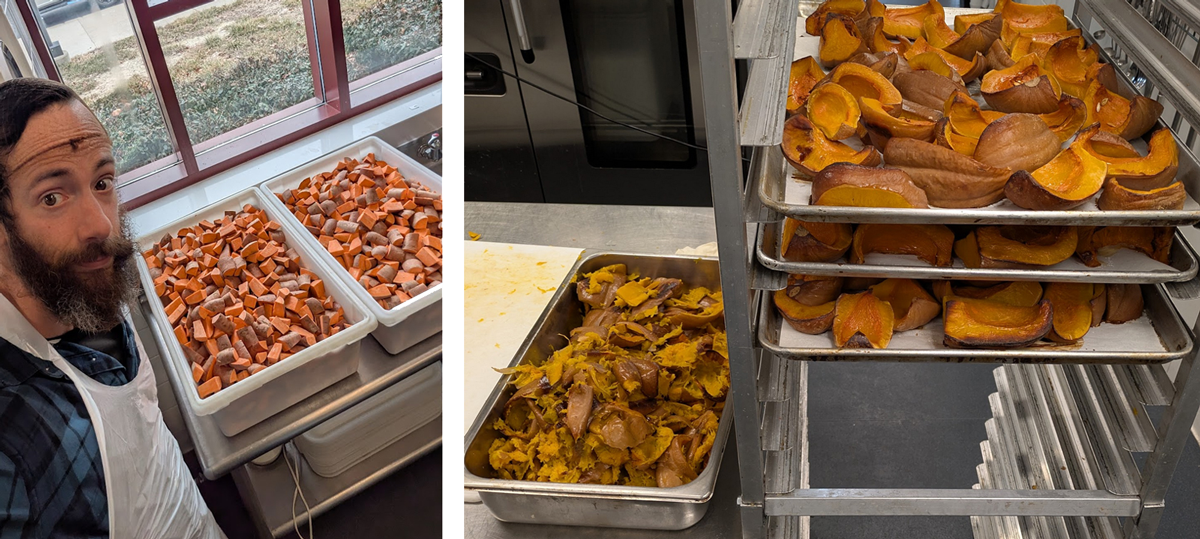Urban Science’s annual Community Giving Initiative empowers employees to direct support toward causes close to their hearts.
For Paul Schweiger, a long-tenured Urban Scientist, that support took shape in a Detroit kitchen. He signed up for a shift with Make Food Not Waste (MFNW), a nonprofit that rescues surplus produce from grocery stores and transforms it into meals for people in need.
What might have felt like a single afternoon’s contribution became the spark for something larger. A company-wide show of support delivered a total of $2,000 to the organization through Urban Science’s annual Community Giving program.
How the Community Giving Program Works
Any employee can nominate a nonprofit to receive a $500 donation that meets program criteria, including close proximity to an Urban Science office location and a four-hour paid volunteerism requirement for the nominating team member. Once all volunteer hours are complete and employees provide recaps of their experiences, Urban Scientists around the world vote for one nonprofit to receive a $1,500 bonus gift.
In 2025, the initiative directed $11,500 across 20 nonprofits worldwide. This diverse list of organizations includes conservation groups, food banks, arts organizations and more.
Each nonprofit and cause reflects the personal passions of the Urban Scientists who chose them, and while there were many deserving organizations up for consideration, Detroit-based MFNW won the bonus vote.

What is Make Food Not Waste?
MFNW has a mission “to make sure that edible, surplus food gets eaten by people (not landfills).” This is important work because every pound saved from landfills protects the environment, feeds communities and honors food’s value in our lives.
MFNW’s upcycling kitchens in Detroit convert rescued produce from grocery stores into nutritious, dignified meals for residents facing food insecurity. In 2023 alone, MFNW served more than 100,000 meals and diverted over 100,000 pounds of food from landfills, preventing over 60,000 pounds of methane emissions in the process.
The nonprofit relies heavily on volunteers like Paul to realize its mission:
“Our work wouldn’t be possible without volunteers,” explained Qing Tiffany, MFNW Community Engagement Director. “Every person who shows up helps us reduce food waste and feed our community.”
What It Feels Like to Show Up
Paul and fellow volunteers spent hours in MFNW’s Detroit kitchen chopping and processing fruits and vegetables, and turning them into nutritious meals for residents facing food insecurity.
“Volunteering with MFNW was grueling, but at the same time, truly inspiring,” said Paul. “Reducing waste is just part of my nature — ask anyone who’s seen me with my reusable spork.”
Seeing the impact firsthand was uplifting, as the produce Paul helped save was going into community meals rather than rotting in a landfill. His decision to spend a day at MFNW’s kitchen not only supported a nonprofit he believes in, but also inspired his colleagues to join him in volunteering at MFNW.
“Sharing that experience with my colleagues inspired others at Urban Science to step up and volunteer, too,” said Paul. “It’s rewarding to see how our personal passions connect and empower us to achieve a larger purpose and create a ripple effect of positivity that reaches far beyond our volunteer day.”
The result? More food rescued, more families nourished and less waste in our landfills.
“At Urban Science, our ability to drive progress and make a difference – focusing on and enriching our local communities – begins and ends with our team members around the globe and applies to everything we do,” said Chris Boumansour, global vice president, Urban Science. “Our collective support of local nonprofits like MFNW shows how grassroots actions taken by our team members continue to create lasting impact. We’re proud of the work Paul and all of our Urban Scientists have done to give back in meaningful ways, both through our Community Giving initiative and through their personal efforts all year long.”
By volunteering with and donating to important causes like MFNW, Paul and his colleagues are helping to build stronger communities while living out our belief that each of us can #DoGreatThings every day.
